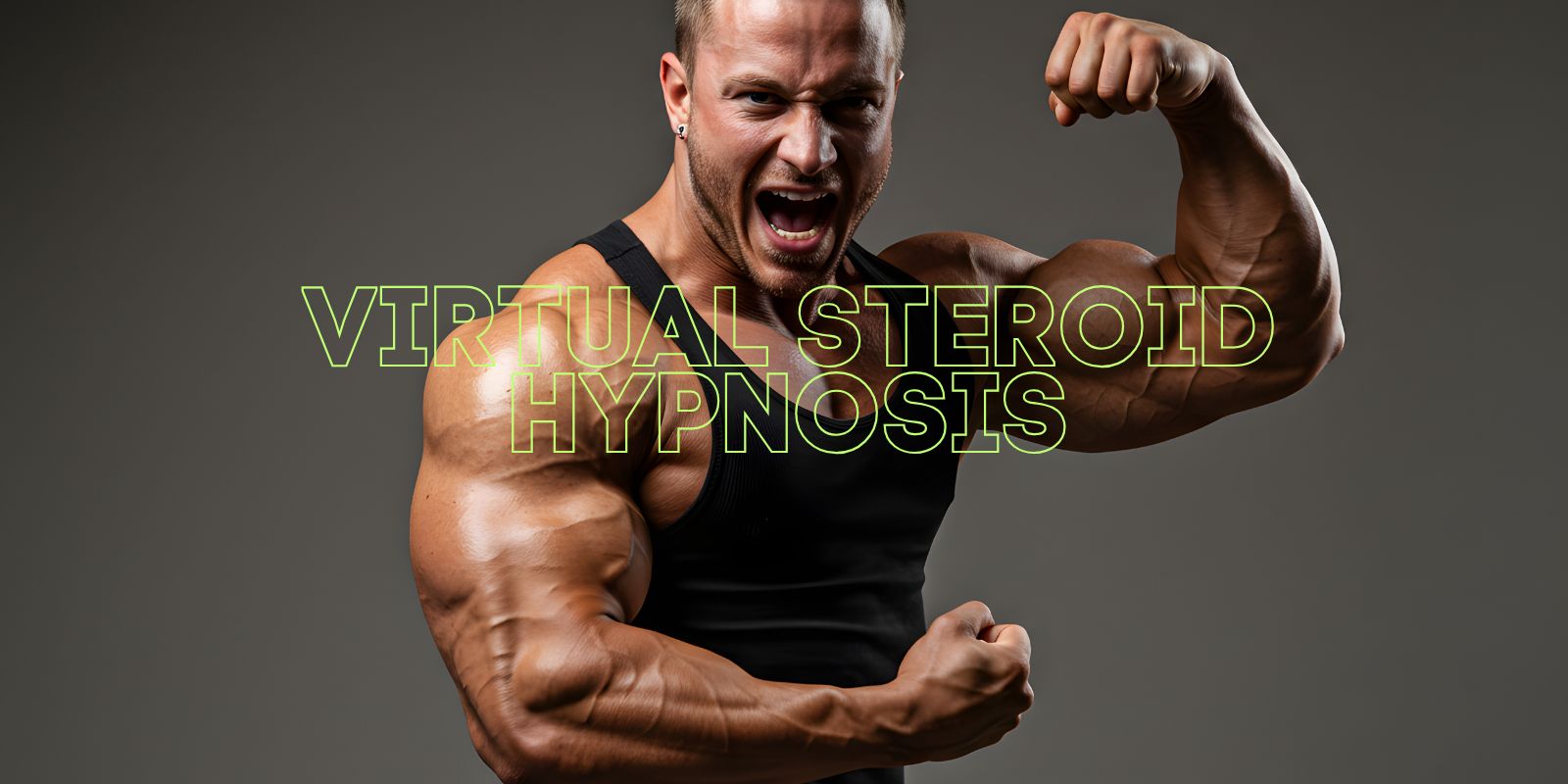Virtual Steroid Hypnosis: A Safe, Smart Alternative for Performance and Recovery
Growing physical performance, reducing recovery time, and improving muscle conditioning are common goals for athletes and committed lifters. While some people turn to anabolic steroids for rapid results, the long-term health risks are well documented. Virtual steroid hypnosis (VSH) offers a safe, non-pharmaceutical alternative that works with your mind’s natural ability to enhance focus, strength perception, and recovery. Through guided imagery and hypnotic suggestion, VSH supports peak performance without the dangers of chemical enhancement.
Virtual steroid hypnosis uses targeted hypnotic techniques and self-hypnosis practice to reduce pain perception, support faster recovery, elevate motivation, and reshape beliefs around performance — offering a powerful alternative to steroids without any medical risks.
Table of Contents
- What Is Virtual Steroid Hypnosis?
- How Virtual Steroid Hypnosis Works in Practice
- Evidence-Based Benefits
- Practical Implementation and Accessibility
- Getting Started—A Simple Guide
- Measuring Progress and Realistic Expectations
- Integrating Hypnosis with Training, Nutrition, and Sleep
- Benefits of Virtual Steroid Hypnosis
- Key Takeaways
- FAQs
- Reframing Strength: The Mind-First Path

What Is Virtual Steroid Hypnosis?
Virtual steroid hypnosis is a guided mental training method that uses hypnotic suggestion, deep focus, and subconscious reprogramming to enhance strength perception, reduce inflammation, and improve recovery — without chemicals. Instead of relying on external substances, VSH strengthens your mental frameworks, helping the brain interpret effort, pain, and recovery more efficiently. This makes it a valuable alternative for athletes seeking performance improvements without the health risks of steroids.
The nervous system plays a central role in controlling force output, muscle activation, and pain thresholds. By altering subconscious expectations and internal narratives, hypnosis helps athletes push through barriers with greater ease. This aligns with self-hypnosis training principles explained in the comprehensive guide to self-hypnosis, which highlights how mental rehearsal strengthens neural pathways linked to performance.
VSH can be practised through live sessions, guided recordings, or self-hypnosis scripts. Over time, athletes report feeling more focused, more resilient, and better connected to their body’s potential — making the method an empowering complement to physical training.
How Virtual Steroid Hypnosis Works in Practice
Most sessions begin with gentle induction techniques that guide the mind into a deeply relaxed, highly focused state. In this receptive mindset, the hypnotherapist uses vivid imagery — such as feeling stronger muscle contractions or experiencing reduced inflammation — to create new expectations in the subconscious. This mental rehearsal becomes a blueprint the brain uses during real training sessions.
Because the subconscious mind thrives on repetition, consistent practice helps new performance patterns take hold. Much like physical training, hypnotic conditioning strengthens with frequency. Over time, athletes find it easier to access states of focus, power, and reduced pain, even outside hypnosis sessions.
Many people choose to listen to VSH recordings before workouts for motivation, or afterward to enhance recovery. Pairing hypnosis with breathwork and progressive relaxation further improves absorption and consistency, helping the mind internalise performance-enhancing suggestions more deeply.
Evidence-Based Benefits
Research has shown that hypnotic suggestion can alter pain perception, reduce anxiety, and increase training output. For example, a recent clinical review on pain modulation explored how hypnotic techniques influence nociception and perception; this is discussed in a recent PubMed study examining hypnotic analgesia and its impact on physiological responses. These findings highlight how hypnosis can influence both mental and physical components of performance.
Emerging controlled trials also support the effectiveness of hypnosis in athletic environments. A ScienceDirect abstract from new performance-focused research discusses how structured hypnotic protocols improve motivational states, recovery quality, and training adherence. These studies emphasise the potential of hypnosis to complement athletic development without pharmacological risks.
While responsiveness varies from person to person, the consensus is clear: hypnosis positively influences performance-related psychological states. VSH is therefore best viewed as a high-impact, low-risk mental training method that enhances consistency, mindset, and pain tolerance — all essential for long-term athletic success.
Practical Implementation and Accessibility
One of the advantages of virtual steroid hypnosis is accessibility. Unlike prescription steroids, VSH requires no medical supervision, no injections, and carries no risk of hormonal disruption. Athletes can engage with sessions from home, via recordings, or with a qualified hypnotherapist specialising in performance psychology. This remote accessibility supports consistency, which is a key driver of results.
Selecting quality programs is essential. Look for practitioners with backgrounds in sports psychology or hypnotherapy rather than generic “mindset coaches.” Programs that offer clearly structured stages, goal-setting, and realistic expectations typically yield stronger outcomes.
The cost is also significantly lower than steroid cycles, which often include medications, bloodwork, supplements, and post-cycle therapy. For athletes exploring deeper personal development alongside performance goals, mind-expansion frameworks like the Quantum Consciousness Encounter can complement hypnosis by strengthening inner awareness and focus.
Getting Started—A Simple Guide
Start by identifying your performance goals. Are you aiming to increase strength, improve recovery, reduce inflammation, or sharpen focus during training? Precise goals help shape hypnotic scripts and make your progress measurable. This clarity also helps you select the right hypnotic program or practitioner.
Next, create a consistent schedule. Most people benefit from three to four sessions per week during the first month. Choose a quiet environment, use headphones, and ensure you won’t be interrupted. Consistency is the key to reinforcing the subconscious patterns that enhance performance.
If you prefer guided sessions, work with a hypnotherapist experienced in athletic performance. Some people also combine guided sessions with self-hypnosis techniques learned from professional resources, allowing them to reinforce progress independently between scheduled appointments.
Measuring Progress and Realistic Expectations
Track both subjective and objective changes. Note shifts in motivation, perceived strength, training enjoyment, and mental energy. Objective markers like increased reps, improved recovery times, or reduced soreness can help validate your progress. Weekly or bi-weekly check-ins are ideal for spotting trends.
Most users notice early mental changes — like improved focus or reduced anxiety — within two to three weeks. Physical performance improvements typically follow within four to six weeks. As with physical conditioning, results vary depending on consistency, mindset, and hypnotic receptivity.
Remember: VSH does not replace hard training or proper nutrition. Instead, it supports your mind in producing better-quality sessions, improving stress resilience, and sustaining motivation — all of which increase your potential for long-term athletic development.
Integrating Hypnosis with Training, Nutrition, and Sleep
VSH becomes more effective when integrated into a complete performance strategy. Pre-workout sessions help with mental activation and focus, while post-workout or evening sessions improve recovery and reduce inflammation-related discomfort. This rhythm reinforces both the physical stimulus and the mental suggestion.
Nutrition also influences hypnotic responsiveness. Adequate protein, essential fats, and micronutrients support cognitive function, mood, and recovery — all of which make hypnosis more effective. Sleep is equally vital, as the subconscious processes hypnotic suggestions most efficiently during deep rest.
If you’re also working on other habits — such as eliminating nicotine or improving emotional resilience — pairing VSH with structured programs like Quit Smoking Hypnosis can support whole-body transformation and better long-term health.
Benefits of Virtual Steroid Hypnosis
Virtual steroid hypnosis provides performance enhancement without hormones, making it a safe alternative for athletes concerned about long-term health. It reduces dependence on chemical shortcuts by strengthening motivation, response to effort, and psychological resilience. Many users report sharper focus during training, reduced anxiety, and quicker recovery after intense sessions.
The financial benefits are also compelling. With no need for medical supervision, no post-cycle therapy, and no pharmaceutical costs, VSH is significantly more affordable than steroid cycles. This allows athletes to pursue high-level conditioning sustainably.
Additionally, VSH improves mental well-being. Confidence, clarity, and reduced emotional stress frequently accompany performance improvements. These psychological gains often become the foundation of long-term athletic consistency and self-belief.
Key Takeaways
- Virtual steroid hypnosis enhances performance using mental training, not hormones.
- Evidence shows hypnosis can influence pain perception and recovery, improving training quality.
- Consistency is crucial: regular sessions create reliable, sustainable changes.
- Integrating hypnosis with sleep, nutrition, and structured training amplifies results.
- VSH is safe, affordable, and ideal for athletes seeking long-term health and performance.
FAQs
Is virtual steroid hypnosis a replacement for steroids?
No. VSH doesn’t replicate hormonal changes. Instead, it enhances mental and physical performance by shifting subconscious responses related to strength, pain, and motivation.
How long until I see results?
Most people notice mental improvements in two to three weeks and physical performance changes within four to six weeks when practising consistently.
Is hypnosis safe for athletes?
Yes. Virtual steroid hypnosis is non-invasive and carries no medical risks. Those with mental health conditions should consult a professional before beginning, but for most people, the technique is very safe.
Can I combine VSH with self-hypnosis?
Absolutely. Self-hypnosis can strengthen and reinforce the changes initiated during guided sessions. You can learn these techniques through structured resources such as the self-hypnosis guide linked earlier.
Where can I read research on hypnosis and performance?
Current evidence can be found in clinical sources like a recent PubMed analysis of hypnotic effects on pain and physiology, as well as new controlled performance studies described in a ScienceDirect abstract on athletic hypnosis interventions.
Reframing Strength: The Mind-First Path
Virtual steroid hypnosis invites athletes to redefine strength as a mind-body synergy rather than a chemical shortcut. By enhancing motivation, reducing pain perception, and improving recovery through subconscious reconditioning, athletes unlock deeper resilience and long-term consistency. Instead of relying on external substances, VSH empowers you to harness the full potential of your mind — supporting performance that is ethical, sustainable, and deeply aligned with your health.
